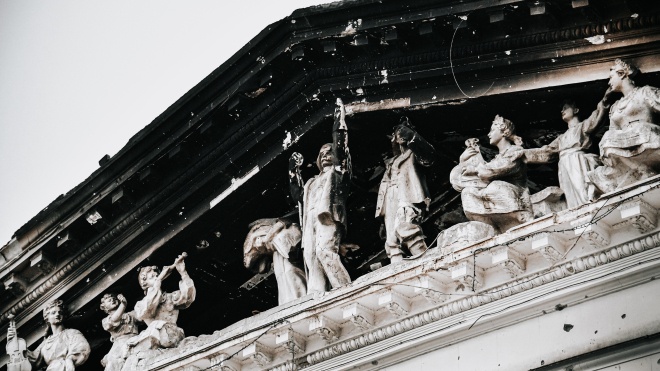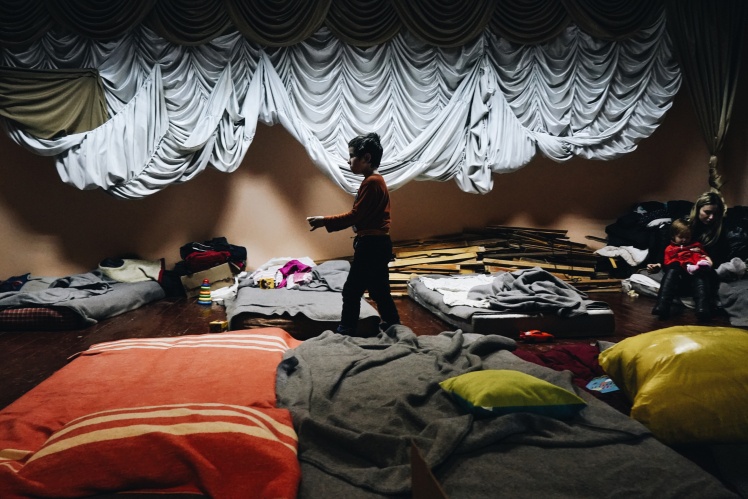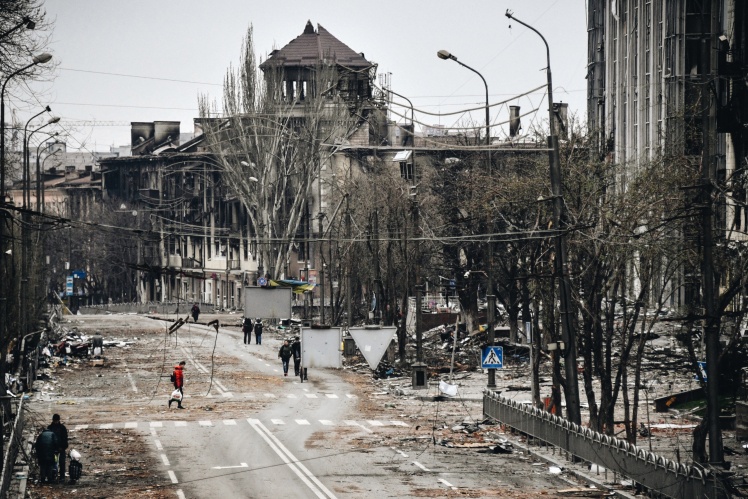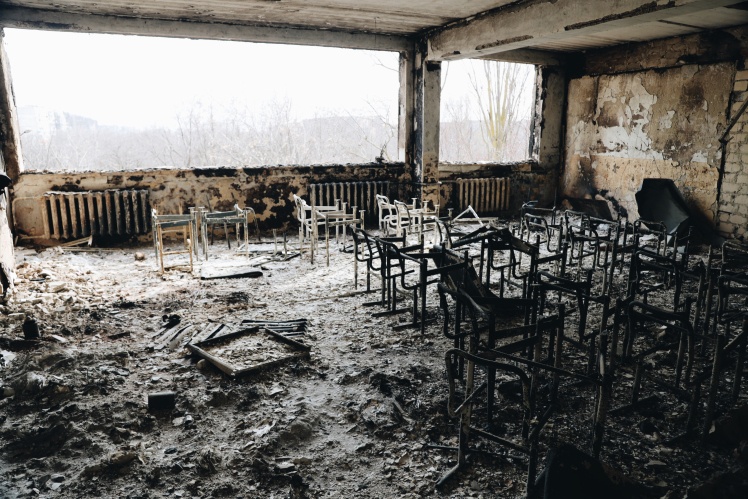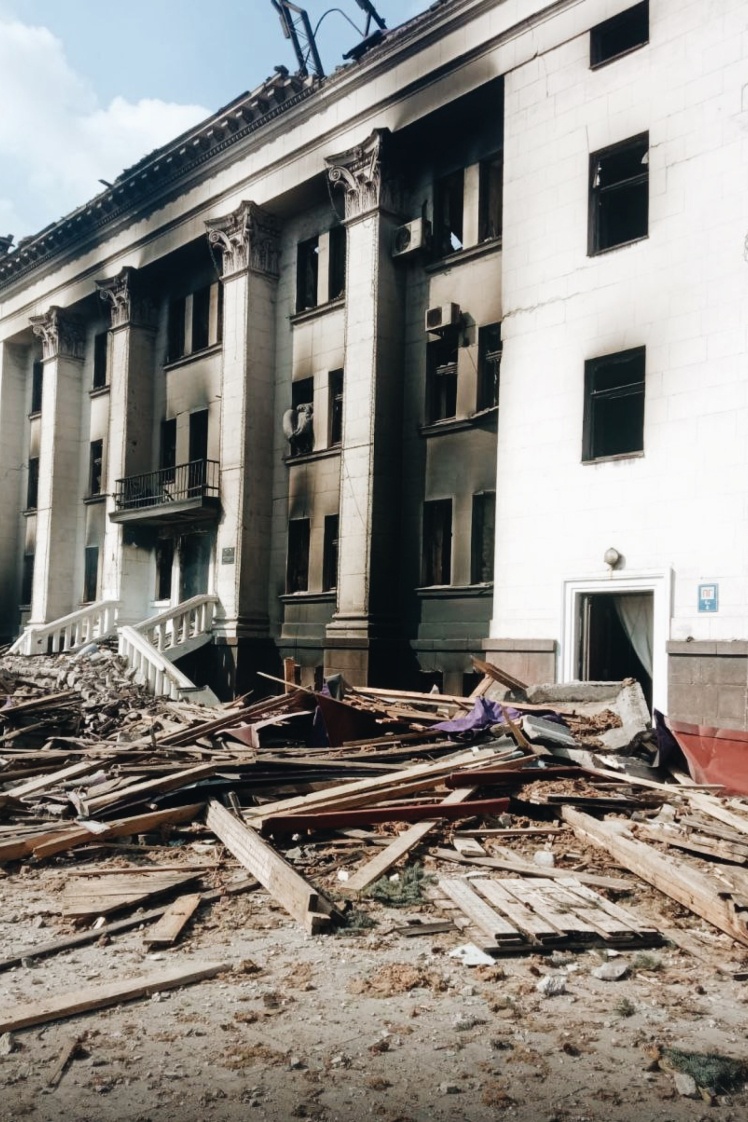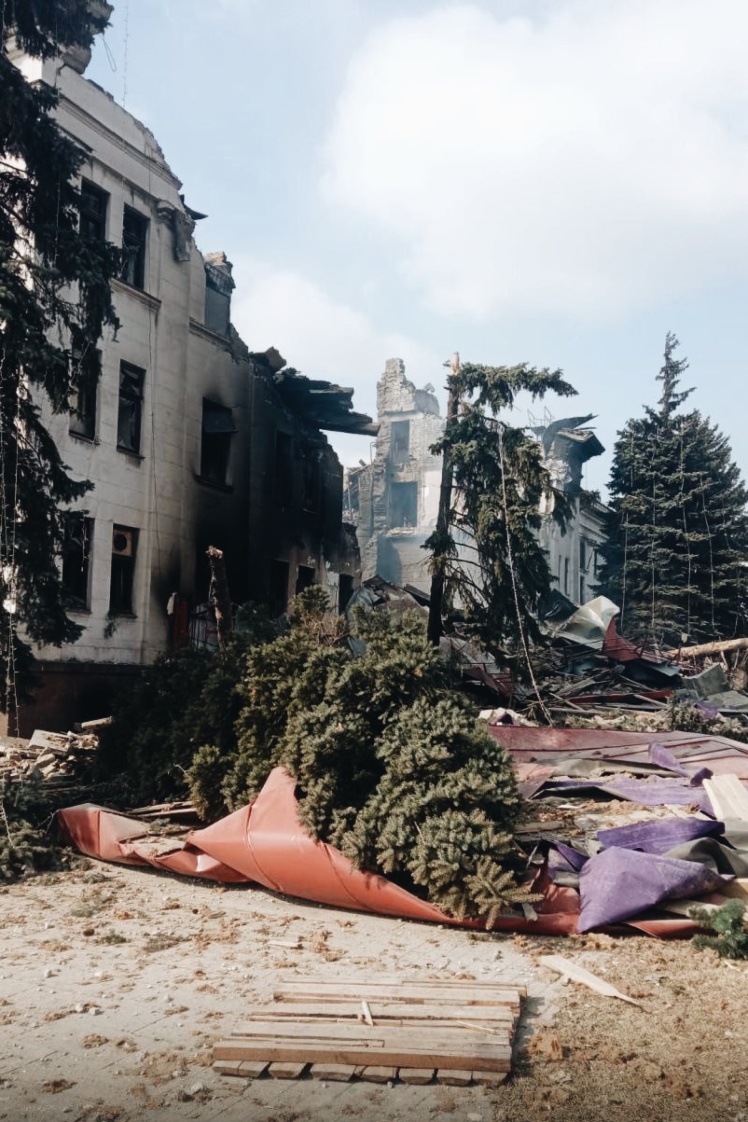1.
On February 24, I woke up very early to the sounds of explosions — they reached from the outskirts of the city even to us, in the very center. We lived with my husband and daughter not far from the theater. In the general chat, the director wrote that we are not going to work today, other employees wrote where explosions could be heard, of what kinds of shells, how many there were. In the evening of the same day, the city council published a list of bomb shelters in Mariupol. The drama theater was among them. My husband and daughter and I went there.
When I came to the theater in the shelter, I knew that I would be able to help people. I worked there for fifteen years as an illuminator, five years as a lighting designer. Sometimes we ran home to get boiling water. Once it turned out that while I was there, the police came and asked the locals to choose the leader. I come back, and people tell me: "You have been appointed the commandant."
Getty Images / «Babel'»
I had to take everything under my control. It was very scary, difficult physically and mentally: you have to find an approach to everyone, help everyone as much as possible. The city then announced an evacuation every day, it was interrupted, new people came to the shelter.
On the first week there were few people: they came only during the bombings. Over time, the shelling became more and more frequent, residents of the city began to gather in families, even from other districts. In the second week, 70 people lived in the shelter permanently, 20 of them were theater workers.
The basement that used to belong to the Tsentralny restaurant served as a bomb shelter. The establishment did not last long, and before leaving the owners knocked down the tiles, cut the pipes and all communications. We constructed an electricity network there to run battery lights, but we couldnʼt make there sewer or water supply. We had no right to do substantial reconstructions in the bomb shelter itself.
The premises were divided into two parts: the restaurant hall and utility rooms. The walls and floor were bare concrete. We took out the old scenery, laid rags on the wooden furniture boards, and put styrofoam on the walls.
Getty Images / «Babel'»
Thatʼs how we lived. We helped each other: someone looked for food, someone ran home to cook for everyone and brought food to the theater. One of our colleagues — the chief engineer — brought hot soups for the children right to the entrance. Serhiy and I also boiled water at home and carried boiling water directly in kettles to the theater so that people could drink tea, steam noodles or instant porridge.
On March 2-3, heating, electricity and water were turned off in the city. To keep the toilets clean, because they were not designed for such a large number of people, we started collecting rainwater, melting snow, and later used tanks for firefighting. The gas was turned off last, and then we were lost. We coordinated all important decisions with the police, so we turned to them. The police found a place on the street near the theater and said that bonfires could be lit there. We put old decorations on firewood and boiled water in vats.
Getty Images / «Babel'»
At the beginning of March, information about humanitarian corridors in the direction of Zaporizhzhia, organized by the Red Cross, appeared on the website of the city council. Among the locations from which the buses were supposed to leave was the theater, but the evacuation was canceled due to shelling. Most of the people from distant areas stayed in the theater — about 500 persons. Everyone was very angry, scared, and confused. Immediately a problem with placement appeared. My team and I quickly pulled ourselves together, pulled out everything we could lie down on or sit on: chairs, armchairs, couches, furniture used in performances. By March 10, we had nothing to cover the ground with, even the curtain from the hall and costumes for performances, which had been in the theater since its foundation, were cut.
2.
Every day I got up at six in the morning, went outside, and watched how everything around me was changing: where the shells fell, what survived, where the smoke was coming from. I went around the theater, found out how people spent the night, what condition the windows and doors were in, and asked the guards how the night went. I didnʼt have time to eat or drink tea. Assistant Nadia ran after me with something hot so that I could grab it on the go.
Getty Images / «Babel'»
We have organized several "services" with separate responsibilities. People monitored the water reserves and replenished them in time, collected firewood, fueled the fire, helped the cooks, repaired what was necessary, and maintained cleanliness. Someone took on the role of a psychologist, calming down the residents of the vault. A boy named Dima came up with the idea of doing a census. We had a journal for each district of the city, in which we indicated the surname, first name, patronymic, year of birth, actual address in Mariupol, and phone number. When people came to the theater, they checked whether the right person was in the list, and then went to look for them in the corridors. Thatʼs how they found each other.
My husband, Serhiy, was responsible for public relations, he ran to the police and volunteer organizations to ask for help, to get advice on how to solve a certain problem. On the second of March, when he first came to the Red Cross, it turned out that they didnʼt even know about us. Then the volunteers periodically delivered everything they could get: toilet paper, toothbrushes, toothpaste, diapers, wet wipes, hygiene products for women, bathrobes, socks, underwear. We had children as small as three weeks old, and I kept bottled drinking water and baby food for them. Every day I poured it into disposable cups, the mothers somehow shared it and fed the children, because it was impossible to give more at a time.
Getty Images / «Babel'»
We didnʼt have enough dishes. Then the police put us in touch with the director of the Van Goghi restaurant. He arrived, opened the door for us, and we took everything we needed. Somewhere on March 7 or 8, 60 people were brought to us from Volonterivka, before that they were hiding in Azovstal. Then there were quite a lot of people, and the police helped us with the field kitchen — they brought it and set it up near the theater in just two hours. Mykhailo, a professional chef with vast experience, was extremely happy. He and I immediately laid out all the products and wrote down on what day we use what. We even baked bread in this field kitchen: when the bakery was bombed, my assistant ran and brought molds, the same evening the girls kneaded the dough. My daughter said that she had never eaten anything tastier. Then they baked bread again, but didnʼt take it out of the field kitchen — it was March 16, the day of the airstrike.
3.
Every day the hostilities came closer and closer to us. The first hit near the theater was about 40 meters away, on the territory of the square. Then the missile hit the underground passage, we were very shaken.
One day a mortar shell flew very close, several people cooking in the field kitchen were injured. Two women had to be hospitalized: one was cut on the leg, the other on the buttock. They were operated on the same day, but on the way back, the women came under fire. The bullet entered the thigh of volunteer Nastya, who was accompanying them, and exited through the abdominal cavity. She was in the hospital for several days, everyone in the theater was very worried about her. We arranged a separate room for her, found all the necessary medicines. She is 15 years old, she seems to have grown up after that. Everything is fine with Nastya now, but her younger brother died after an airstrike.
Getty Images / «Babel'»
Sometime on March 10, my assistant Sargiz suggested making the inscriptions “ДЕТИ” (“CHILDREN”) on both sides of the theater. I agreed. We went to the workshop of theater artists, found white paint and made two inscriptions: in capital letters, very evenly and qualitatively. We thought it would save us. Indeed, there were mainly women, children, and elderly people in the theater. I often hear that the Azov regiment lived in our basement. It isnʼt true. We never had military personnel, we never hid from anyone: drones were constantly flying over the theater, a field kitchen could be seen from afar, drinking water was delivered to us from the city, people came to find out about the evacuation.
4.
All night on March 16, before the airstrike, I didnʼt sleep. They [the occupiers] hit so hard that the ground shook. Periodically, I went down, looked at my daughter in the basement — surprisingly, she was sleeping. Other people sat by candles, constantly praying, because the explosions were wild, very close, just around us.
Early in the morning, the cityʼs residents themselves began to organize convoys and leave. They tied white rags on the cars, and whoever had free seats in the car, took other women and children who were without transport. I was also offered the option to leave several times, but always answered: "Where will I go? How can I leave all this?". We walked with the cook, looked to see how many people were left. We understood that today in the field kitchen we will get by with two vats, instead of four, as usual.
I had to discuss something with my husband, and I led him to the premises of the electrical workshop so that no one would interrupt us. This room was actually a warehouse, it had two thick walls with doors to the stage. As soon as we started talking, I heard a bell, saw sparks, followed by darkness. I remember how I lay down on a pile of garbage, something was dusting down on me, and it was dusting and dusting, so I realized that something had exploded.
Getty Images / «Babel'»
I didnʼt lose consciousness. When everything quieted down, I started to talk to my husband and realized that both were alive. Serhii was the first to dig out, he helped me. We look through the door at the stage — there is no roof, the metal from the soffits is twisted and deformed, like a spiderʼs web, cables and pipes are covered with plaster. In an instant, everything that surrounded me turned into a mountain of garbage, as if the premises had been ground up, torn apart from the inside. What saved us was that we went to talk to the workshop. I had a shrapnel wound in my leg and a bleeding. Later, when we left for Berdyansk, the leg was cleaned by surgeons, and for a month different trash was coming out of it. Linoleum, wood chips, glass, whatever you can imagine was there.
I understood that we need to find a child. We went out into the corridor, there is a crowd of people, everyone is scared, but there is no stampede. Everyone headed for the basement, thinking itʼs safer there. We went down and saw that in the basement people were just as scared, someone was shouting, looking for others. While making my way through the basement, I noticed a dead person.
Finally, we found our daughter in the basement. We all run up to her in plaster, as if after a makeup: our hair is white, our clothes are torn. She was probably even more scared because of this. They all left together through the basement into the lobby of the second floor. There were three huge stained-glass windows, due to the blast wave they flew right at people.
My daughter and I ran to my father, he lived a few blocks away. My husband stayed and helped to pull people out from under the rubble until the fire started. He joined us about an hour and a half later. His moral condition was terrible: he had seen so many dead people there. The City Council reported that about 300 people had died due to this shelling.
5.
We understood that sooner or later attacks would reach this district as well. And so it happened: we were bombarded the very next morning — on March 17. So my husband, daughter, son, nephew and I decided to leave the city in the old Zhiguli car. We took almost no belongings, except for those that were on us. We drove under bombardment through Portivske to Mangush, from Mangush to Berdyansk, then to Zaporizhzhia. At that time, there were no filtration camps, but there were many roadblocks: men were constantly pulled out of the car by the Russian military and searched for tattoos. During the explosion, the door flew out on Serhiy, and his shoulder was literally black after that. He was constantly asked what it was, whether he had fought with someone.
Getty Images / «Babel'»
Thanks to good people, we are all safe now. I still remember how the boys laughed that when the war was over, we would continue to live in our dormitory called Theatre and rebuild the city. These words warm my heart so much. When the head of the Red Cross came to see what we needed, he said: "Iʼm in shock. This was not organized in any bomb shelter." Nothing would have been possible without my helpers, I am infinitely grateful to all of them, I am still in touch with some.
Translated from Ukrainian by Anton Semyzhenko.
Each such story is both a memory and a document for justice. Help us collect them. Support Babel: Patreon 🔸 [email protected]🔸donate in cryptocurrency🔸in hryvnia.
